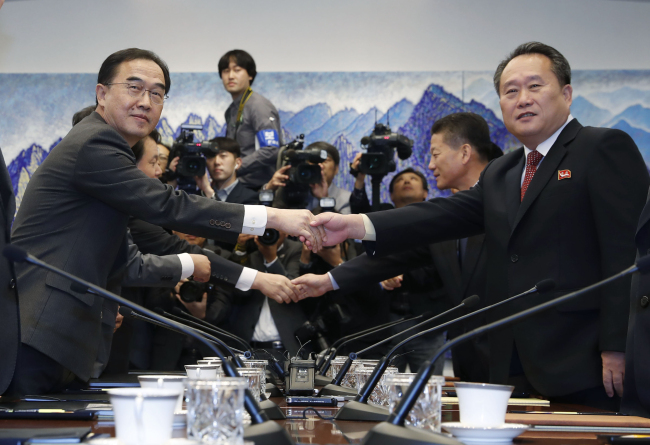The timeline for a chain of inter-Korean projects is being pushed back with meetings and events planned for October failing to take place, amid Washington’s apparent concerns that the Koreas’ ties may be outpacing its denuclearization talks with Pyongyang.
In early October, the two Koreas held high-level talks and drew a rough timeline to carry out the key projects mentioned in the agreement reached between their leaders in September. Among them, a joint survey for cross-border railway and sports and health meetings to bolster exchange in the respective areas, were initially planned to be launched by the end of October, but were not realized.
 |
South Korean Unification Minister Cho Myoung-gyon, left, shakes hands with Ri Son-gwon, chairman of the Committee for the Peaceful Reunification of the Country at high-level talks held in Panmunjom on Oct. 15. (Yonhap) |
Other items for October, such as a performance by a North Korean art troupe in Seoul and the excavation of an ancient palace site in the North, have also failed to materialize.
The two Koreas’ efforts to field a joint survey for modernization of cross-border railways and roads have been facing a number of obstacles. The process has been halted since the US-led United Nations Command declined the Seoul government’s proposal to test-run a train across the border, citing “procedural” issues. But the move was widely interpreted as US objection to the project on possibilities that it may hamper sanctions.
Both sides have conducted a joint inspection to examine the state of the decades old railways that run through both east and west coast of the Korean Peninsula in July, but has been unable to push the project forward since.
On lackluster progress in the railways project, Unification Minister Cho Myoung-gyon admitted there were areas where the South and US hold slightly different views, at a parliamentary audit held Monday. The project is not fundamentally subjected to the sanctions against North Korea, he noted, but the government is negotiating with the UNC on the oil the train is expected to carry during the test-operation when crossing the border to the North.
But the US’ reluctance to hand such sanctions exemptions smoothly is not the only problem, with a Unification Ministry official telling reporters on Tuesday that the delayed October schedule was “partly due to” North Korea’s “lack of response.”
The official said that the ministry is still waiting for the North’s response on the Pyongyang art troupe’s planned autumn performance in Seoul and evaded a direct response when asked if the concert will able to take place in November.
Taking its cue from recent developments, South Korea seems to be stuck in a position where it needs to appease both the US and North Korea. A meeting on inter-Korean forestry cooperation that managed to take place earlier this month wrapped-up in a tense mood, with North Korean officials complaining about the meeting failing to meet expectations.
Critics suspected the North was dissatisfied with the results that reflected the South’s cautious steps in regards to UN resolutions.
On Tuesday, South Korea and the US decided to launch a working group to improve coordination on their joint approach towards North Korea,
The group, which is expected to work as a tight channel between Seoul and Washington, is expected to be a double-edged sword for South Korea on carrying out its projects with the North, critics say. Depending on how Seoul will use it, it could be an excuse for Washington to gain excessive knowledge of inter-Korean cooperation, or a platform to convince the US more smoothly on such projects based on transparency and trust.
By Jung Min-kyung (
mkjung@heraldcorp.com)








